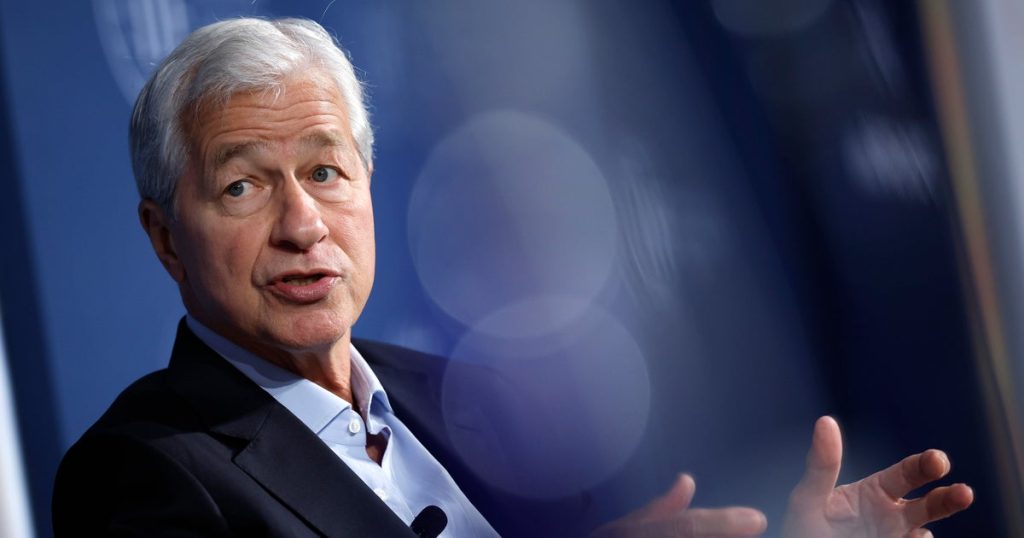In a recent earnings call, JPMorgan Chase CEO Jamie Dimon identified significant challenges facing the U.S. economy, particularly those stemming from ongoing tariff policies. Dimon noted that although there are potential upsides associated with tax reform and deregulation, trade tensions could exacerbate inflation and stifle growth. He reiterated the banking giant’s commitment to reforming trade deals, which could provide relief to the economic strain. This call comes alongside JPMorgan’s impressive quarterly earnings that surpassed analyst expectations, showcasing resilience amid market volatility.
| Article Subheadings |
|---|
| 1) Economic Challenges Ahead |
| 2) The Impact of Tariffs on Inflation |
| 3) Trade Negotiations and Their Significance |
| 4) JPMorgan’s Strong Performance |
| 5) Market Reactions to Economic Policies |
Economic Challenges Ahead
The U.S. economy is currently navigating a complex landscape marked by uncertainty and turbulence, as highlighted by Jamie Dimon. On a recent earnings call, he emphasized how geopolitical tensions, along with domestic policy decisions, are creating a volatile environment for economic growth. As the banking giant’s leader, his insights are crucial for investors and policymakers alike, as they provide a snapshot of the financial sector’s outlook.
Dimon cautioned that the mixture of potential growth drivers, such as tax reforms and deregulation, alongside negative pressures, including trade wars and persistent inflation, could hinder economic expansion. The combination of these factors points to a challenging stretch ahead, one in which businesses may need to adapt quickly to shifting economic policies and consumer behaviours.
The Impact of Tariffs on Inflation
On the topic of inflation, Dimon revealed that JPMorgan expects tariffs to lead to a rise in inflation by approximately 0.5% within the fiscal year. The implications of such increases could ripple through various sectors, affecting consumer prices and business operating costs. Dimon’s stance reflects broader concerns among economists who warn that prolonged tariffs may lead to an inflationary environment.
Moreover, the effect of tariffs can vary by industry, with sectors reliant on imports likely to feel the pressure more acutely. Dimon pointed out that understanding these nuances is essential for navigating the upcoming fiscal challenges; businesses will need to strategize on pricing and supply chains to mitigate the negative effects of increased tariffs.
Trade Negotiations and Their Significance
Despite the palpable challenges, Dimon expressed optimism regarding the Trump administration’s approach to trade deals. He believes that engaging in negotiations with other countries can alleviate economic strain by reducing tariffs and fostering better business relations globally. As trade policies become a focal point in fiscal discussions, the necessity for constructive dialogue among countries grows increasingly critical.
He stated,
“I would like to see the administration negotiate trade deals. I think that will be good for everybody, and they want to do it, too.”
This perspective underscores the belief that collaborative trade relations are fundamental for sustained economic growth and stability, a sentiment shared among several industry leaders.
JPMorgan’s Strong Performance
Despite the economic headwinds, JPMorgan reported remarkable first-quarter earnings that exceeded Wall Street forecasts. Dimon noted that the bank’s markets division was a significant contributor to this success, showcasing resilience in turbulent times. The earnings per share rose from $4.44 to $5.07 year-on-year, surpassing expected projections of $4.63.
Total managed revenue for the quarter reached $46 billion, an increase from $41.9 billion in the previous year. This performance highlights JPMorgan’s ability to navigate a challenging market landscape while positioning itself for future growth, even amidst uncertainty surrounding trade policies and economic fluctuations.
Market Reactions to Economic Policies
The market’s response to President Trump‘s tariff policies has been predominantly negative, as evidenced by sharp declines in investor confidence. Dimon noted that issues surrounding tariffs have sparked considerable debate among CEOs and investors regarding their long-term impact on America’s standing as a trading partner.
In a recent interview, Trump addressed the suspension of “reciprocal” tariffs for a 90-day period, acknowledging the concerns raised by business leaders, including Dimon, who suggested that these tariffs could lead to a recession.
According to Dimon, the tariffs could slow down growth and hinder economic stability.
Such apprehensions are echoed by industry experts, leading to calls for a reevaluation of trade strategies to promote a more favorable economic climate.
| No. | Key Points |
|---|---|
| 1 | The U.S. economy is currently facing significant challenges due to geopolitical tensions and tariff policies. |
| 2 | JPMorgan Chase anticipates a rise in inflation due to tariffs, up to 0.5% this year. |
| 3 | Dimon expressed optimism regarding potential trade negotiations and their positive impacts. |
| 4 | Despite challenges, JPMorgan reported earnings that exceeded market expectations. |
| 5 | Market reactions to tariff policies have been largely negative, raising concerns among executives. |
Summary
The recent remarks by Jamie Dimon, CEO of JPMorgan Chase, underline the precarious situation of the U.S. economy amidst ongoing tariff debates. While the bank’s strong quarterly performance indicates resilience, the long-term effects of current trade policies remain uncertain. Both businesses and the government must engage in meaningful dialogues to foster a more stable economic environment that can withstand geopolitical pressures.
Frequently Asked Questions
Question: What are the potential impacts of tariffs on inflation?
Tariffs could lead to an increase in inflation, as they typically raise the costs of imported goods, which in turn can impact consumer prices and business operating costs.
Question: How did JPMorgan perform in the recent quarter?
JPMorgan reported earnings per share of $5.07, exceeding Wall Street’s expectations of $4.63, and total managed revenue hit $46 billion for the quarter, reflecting a robust performance.
Question: What role does trade play in influencing the U.S. economy?
Trade significantly influences the U.S. economy, as trade policies can determine competitiveness, affect inflation, and influence economic growth. Engaging in fair negotiations can foster better trade relations and promote overall economic stability.
